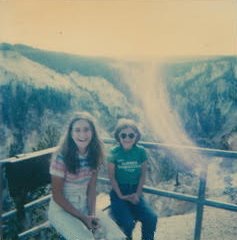How a Trip to Yellowstone Changed How We Think About Food

40 years ago, our family traveled to Yellowstone National Park to camp for a few days. When we entered the park, the ranger handed us a newspaper with the headline “Human Food Kills Bears.” That headline was about to change our lives and those of our progeny. We realized that if our food was killing 300 lb. bears, it wasn’t doing us much good either. That was the start of something big.
When we returned home, we read every label in our kitchen and threw out food that had chemicals, preservatives, or white sugar. Then we went shopping, a trip that took 3 hours! We read every label to learn which brands to purchase for our future lives.
Next came years of research into nutrition and we dubbed ourselves fully “health food nuts.” I learned about organic food and regenerative farming. I learned about the differences between various kinds of sugar. And I began to advocate for healthier food. We joined our local food coop and continue to purchase organic food, locally produced when possible, and buy our meat directly from local organic farmers.
I taught our children about food and food choices and now they teach their children. Two of our children became small organic farmers at Rancho de los Proyectos and Dancing Branches Farm. Another is director of the Vermont Donor Milk Center, providing the most healthful food to babies with a medical need. One child, the artistic director of Ballet Vermont, is now renowned for their Farm to Ballet Project, performing the entire growing season for thousands of Vermonters each summer on the grass on farms, and sharing the gate with the farmers, now expanding to other states. Their Bees and Friends Project centers on the role of bees, lady bugs, fire flies, and other critters that keep our food healthy, again performing across the state. Another child plans to open her own small shop, serving Equal Exchange coffee, tea, and cocoa. So food has become central to our family culture.
And what about mama? When I retired from my editing job, I expanded my understanding of what makes the most sense for the health of the earth and the benefits to workers. I now support worker coops and the necessity for authentic fair trade. I learned about the corporate food ladder and now work to combat it by selling ethically sourced food directly to Americans.
Last year, I formed Just Food Hub (justfoodhub.us), selling Equal Exchange products and a few other goods from small organic US farms while raising money for many local and statewide organizations. Starting in Vermont, we are beginning to expand to other New England states. As volunteers, we are able to advance the model of ethically raised food, giving all the profit to organizations to sustain many exciting causes. We are also helping small stores increase their stock of ethically sourced foods for their clientele.
Thanks, Yellowstone.

